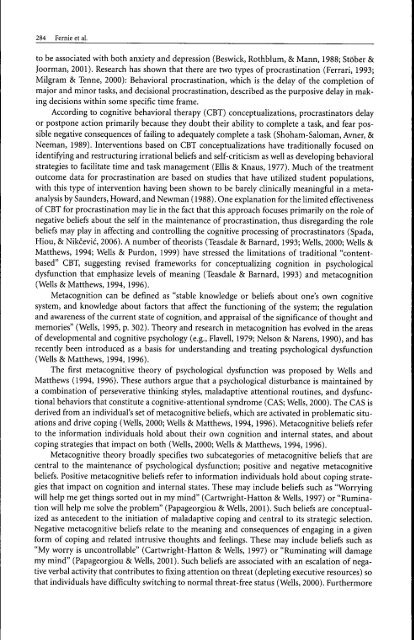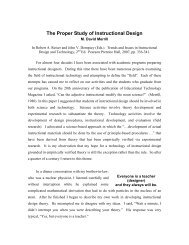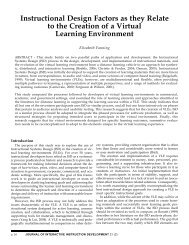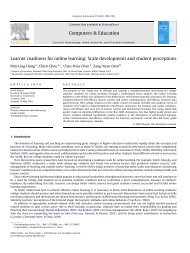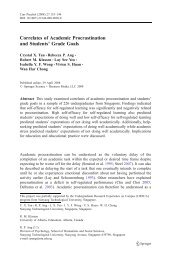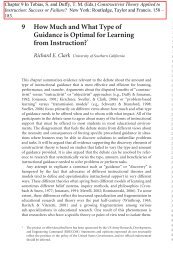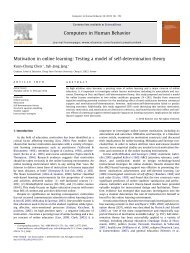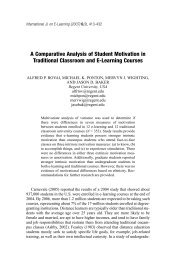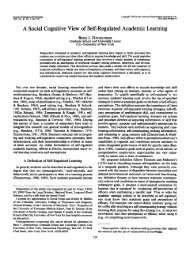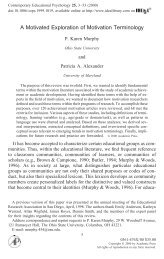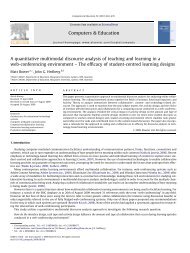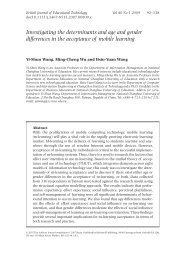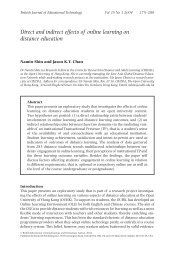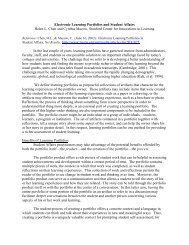Metacognitive Beliefs About Procrastination ... - Anitacrawley.net
Metacognitive Beliefs About Procrastination ... - Anitacrawley.net
Metacognitive Beliefs About Procrastination ... - Anitacrawley.net
You also want an ePaper? Increase the reach of your titles
YUMPU automatically turns print PDFs into web optimized ePapers that Google loves.
284 Fernie et al.to be associated with both anxiety and depression (Beswick, Rothblum, & Mann, 1988; Stöber &Joorman, 2001). Research has shown that there are two types of procrastination (Ferrari, 1993;Milgram & Tenne, 2000): Behavioral procrastination, which is the delay of the completion ofmajor and minor tasks, and decisional procrastination, described as the purposive delay in makingdecisions within some specific time frame.According to cognitive behavioral therapy (CBT) conceptualizations, procrastinators delayor postpone action primarily because they doubt their ability to complete a task, and fear possiblenegative consequences of failing to adequately complete a task (Shoham-Saloman, Avner, &Neeman, 1989). Interventions based on CBT conceptualizations have traditionally focused onidentif^'ing and restructuring irrational beliefs and self-criticism as well as developing behavioralstrategies to facilitate time and task management (Ellis & Knaus, 1977). Much of the treatmentoutcome data for procrastination are based on studies that have utilized student populations,with this type of intervention having been shown to be barely clinically meaningful in a metaanalysisby Saunders, Howard, and Newman (1988). One explanation for the limited effectivenessof CBT for procrastination may lie in the fact that this approach focuses primarily on the role ofnegative beliefs about the self in the maintenance of procrastination, thus disregarding the rolebeliefs may play in affecting and controlling the cognitive processing of procrastinators (Spada,Hiou, & Nikcevic, 2006). A number of theorists (Teasdale & Barnard, 1993; Wells, 2000; Wells &Matthews, 1994; Wells & Purdon, 1999) have stressed the limitations of traditional "contentbased"CBT, suggesting revised frameworks for conceptualizing cognition in psychologicaldysfunction that emphasize levels of meaning (Teasdale & Barnard, 1993) and metacognition(Wells & Matthews, 1994,1996).Metacognition can be defined as "stable knowledge or beliefs about one's own cognitivesystem, and knowledge about factors that affect the functioning of the system; the regulationand awareness of the current state of cognition, and appraisal of the significance of thought andmemories" (Wells, 1995, p. 302). Theory and research in metacognition has evolved in the areasof developmental and cognitive psychology (e.g., Flavell, 1979; Nelson & Narens, 1990), and hasrecently been introduced as a basis for understanding and treating psychological dysfunction(Wells & Matthews, 1994,1996).The first metacognitive theory of psychological dysfunction was proposed by Wells andMatthews (1994, 1996). These authors argue that a psychological disturbance is maintained bya combination of perseverative thinking styles, maladaptive attentional routines, and dysfunctionalbehaviors that constitute a cognitive-attentional syndrome (CAS; Wells, 2000). The CAS isderived from an individual's set of metacognitive beliefs, which are activated in problematic situationsand drive coping (Wells, 2000; Wells & Matthews, 1994,1996). <strong>Metacognitive</strong> beliefs referto the information individuals hold about their own cognition and internal states, and aboutcoping strategies that impact on both (Wells, 2000; Wells & Matthews, 1994, 1996).<strong>Metacognitive</strong> theory broadly specifies two subcategories of metacognitive beliefs that arecentral to the maintenance of psychological dysfunction; positive and negative metacognitivebeliefs. Positive metacognitive beliefs refer to information individuals hold about coping strategiesthat impact on cognition and internal states. These may include beliefs such as "Worryingwill help me get things sorted out in my mind" (Cartwright-Hatton & Wells, 1997) or "Ruminationwill help me solve the problem" (Papageorgiou & Wells, 2001). Such beliefs are conceptualizedas antecedent to the initiation of maladaptive coping and central to its strategic selection.Negative metacognitive beliefs relate to the meaning and consequences of engaging in a givenform of coping and related intrusive thoughts and feelings. These may include beliefs such as"My worry is uncontrollable" (Cartwright-Hatton & Wells, 1997) or "Ruminating will damagemy mind" (Papageorgiou & Wells, 2001). Such beliefs are associated with an escalation of negativeverbal activity that contributes to fixing attention on threat (depleting executive resources) sothat individuals have difficulty switching to normal threat-free status (Wells, 2000). Furthermore


